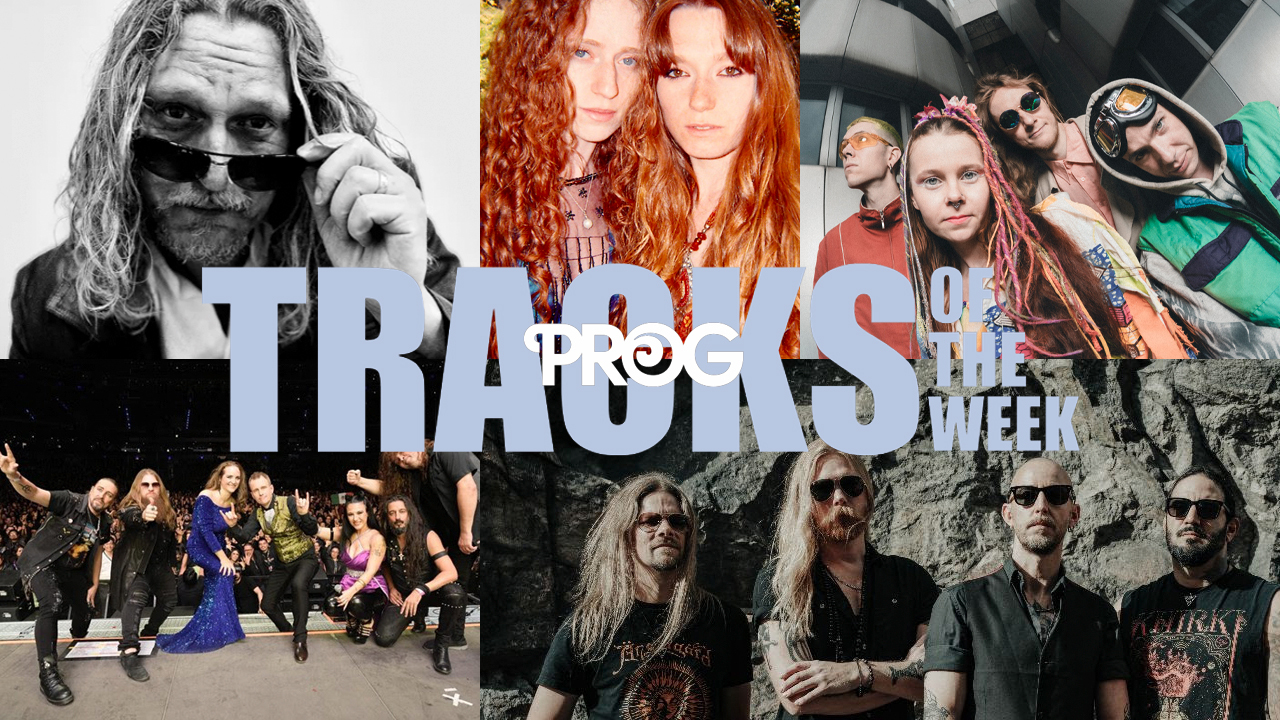“We got pretty eclectic and threw some stuff in that we shouldn’t. We wanted to expand our fanbase – but the effort didn’t really pay off”: When Spock’s Beard went back to basics with X
Funded via the “Marillion Method,” the band’s 10th album was their strongest since the departure of Neal Morse eight years earlier

Spock’s Beard weren’t sure if they had a future when Neal Morse left in 2002. It took them eight years to establish their new approach. But when they did, on 2010’s X – originally released via crowdfunding – the results were phenomenal. They told Prog the story soon after its launch.
Laconic, warm and worldly, Alan Morse’s Californian tones convince you that every shitty thing’s going to work out fine. “I did a solo record a couple of years ago, and I had a percussionist called Eric Darken on it. And I never met him, never even talked to him on the phone. We did it all by email – I sent him tracks, he overdubbed his parts, sent them back, and it worked out great. It’s a weird way to work, but kinda cool.”
In the 18 years since the guitarist formed Spock’s Beard with brother Neal, seismic shifts in technology have re-shaped the world of music, from the way songs are written and recorded, to how they’re financed and distributed. The tremors have been felt by all musicians, from the bedroom amateur knocking out broadcast-quality songs on their laptop, to established stadium rockers monetising (ghastly word) their success with VIP packages aimed at wealthier concert-goers.
On their tenth album X, Spock’s Beard have embraced many aspects of this digital age, when the idea of musicians hammering out ideas together in a sweaty rehearsal studio seems almost quaint.
“Back in the old days bands would write a song and play it for a year before recording it,” says Spock’s bassist Dave Meros. “All the little parts and nuances would get worked out by playing it hundreds of times at gigs. We don’t do that. We tend to write independently with our respective writing partners. Then when it’s time to record we all send round demos to each other, play on each other’s demos. It’s pretty easy these days. We upload our files onto a server, the others download it into their project, you cut and paste, modify. It usually works out well.”
It certainly has in this case. X is a consistent album, maybe their most solid and characteristic piece of work since band mainstay Neal Morse left in 2002, leaving drummer Nick D’Virgilio to assume vocal duties. It’s certainly a more focused effort than their uneven self-titled opus four years back, which split fans and critics alike.
“We got pretty eclectic for a little while,” says Alan Morse, “and threw some stuff in that we shouldn’t. We wanted to expand our fanbase – but the effort didn’t really pay off for us. So we’ve tried to get back to our roots and make a classic Spock’s record, something that was right in the pocket.”
Sign up below to get the latest from Prog, plus exclusive special offers, direct to your inbox!
Recorded at LA’s Mouse House (a studio favoured by acts such as Dream Theater, Chris Cornell and Neal Morse’s own supergroup Transatlantic), X is a fusion of all the elements that make Spock’s Beard special. Their prog credentials are evident throughout knotty, many-sectioned workouts such as the romantic rocker From The Darkness and 16-minute suite Jaws Of Heaven. D’Virgilio seems to have relaxed into his dual role, Morse’s guitar lines are by turns lyrical and avant-garde, and Spock’s overall sound is sweetened by their West Coast pop sensibility. Vocal harmonies leaven Edge Of The In Between and The Emperor’s Clothes – a deliciously dark, psychedelic pop song with a killer chorus.
“I’ve never thought of myself as much of a lyricist,” says Morse. “I’d usually hook up with someone else to do that. A few years ago I got on a lyric-writing binge, I thought that’s what would help with the record. I had this whole little ritual: I’d go down to Starbucks, order a double-cappuccino, sit there and write. I churned out tons of stuff, six or seven pages at a time. The Wizard Of Oz has always had resonance for me, and [X highlight] Man Behind The Curtain came from that. I’d take something and put some kind of a spin on it. In the …Emperor’s Clothes I thought, how about writing it from the point of view of the tailor who made the clothes?”
All this creativity flies in the face of the harsh realities of the industry. Today most advances are small and margins are tight, particularly for middle-rank artists, and especially in niche markets like progressive rock. Spock’s Beard realised that if they were to capture their musical vision undiluted, they would have to embrace a new business model.
We put your name in the booklet and we also put your name in a song… in the end we had to put 130 names into a song
Dave Meros
“We spend a lot of money recording,” says Dave Meros, “and our advance had decreased to the point where we’d have had to start cutting corners, and we didn’t want to do that. Our fans were suggesting ways we could make money, and one of the things they came up with was for us to use the ‘Marillion Method’.”
Using the British band’s approach, Spock’s raised the capital for the sessions by asking fans to pre-order the album through their website, with the enticing, pricier options of a limited edition and ‘ultra package’.
“We got about 2,000 preorders,” says Meros. “The ultra package we offered was really key in making the thing work because it really kicked up our revenue. You got the T-shirt and a bit of swag in there, but the main feature was we put your name in the booklet as an executive producer and we also put your name in a song. It was kind of expensive, and in the end we got 130 people signed up for it so we had to put 130 names into a song! We came up with a really cool concept and called it Their Names Escape Me. It turned out to be one of the highlights of the record actually.”
“More and more people are doing it this way,” adds Morse. “What else can you do? the whole record business is so messed up; nobody seems to know what the heck to do anymore. This seemed like a more direct way to do it and it’s paid off. It’s very gratifying that people are into it enough to pay up-front for the album and support something that they care about, especially when so many people are downloading for free.”
It’s tempting to attribute the sheer quality of the new record at least partly to the fans’ fresh investment in Spock’s Beard. It also raises the question of just what drives the band to fight the good fight in such a hostile environment. Refreshingly, it would seem to be for the love.
“There was a time after Neal left when I thought we might have to give it up,” says Morse. “I didn’t want to, none of us did, but we were worried we might not be able to continue without him. We didn’t know if the fans or the label would support us, or if it would even work without him. But luckily it has worked out well, at least as well as it has so far – we’re still at it. I could see where people could have said, this is a totally different thing and just bail on us, but again, they didn’t, they stuck with us.”
A lot of bands are charging for these VIP packages and some people have said we should do that – but, nah, we give that for fre
Alan Morse
“Even after Neal left we all wanted to try and make it work,” remembers Meros. “When we first formed we’d look at each other and think, ‘Wow this is the best thing I’ve ever been in.’ There’s a lot of that spirit which carries us through, even during the rough times. We don’t hang out – the only time I see them when is when we have band stuff to do, but by the same token we’re still pretty close.”
D’Virgilio is currently drumming for Cirque Du Soleil in Montreal and keyboardist Ryu Okumoto only recently returned to California from Osaka. Meros is in LA as a jobbing bass player but he’s still 400 miles away from Morse, who daylights as CEO of DynaMetric, a manufacturer of telephone recording products. Now X has been picked up for distribution by Mascot Records and they’re taking it out on the road this autumn although down to ‘logistics and timings’ the UK won’t feature in their European tour itinerary.
“There’s definitely a big fanbase for progressive music out there, and a good thing about the internet is stuff like ours can find an audience, even though it’s scattered around the planet. I get emails and Facebook messages from all over, from Italy to South America.”
Fortunately, Spock’s Beard remain unreceptive to one of the modern music business’s more cynical revenue streams (another ghastly term): the paid-for meet-and-greet.
“A lot of bands are charging for these VIP packages,” says Morse, “and some people have said we should do that but, nah, we give that for free. We usually come out after the gig and sign autographs and hang out it’s part of the fun. Besides, I don’t think people would pay that much really for the privilege!”
Morse laughs heartily. Every shitty thing, everything will be just fine.
“You know, someone once asked me, would you rather be a musician, go on tour and make records, or be a president of a company. I said, are you crazy?! That’s an easy one! The business side of things appeals to the part of me that likes to eat, but I’d love Spock’s to be the centre of things for all of us. Maybe one of these days.”
A music journalist for over 20 years, Grant writes regularly for titles including Prog, Classic Rock and Total Guitar, and his CV also includes stints as a radio producer/presenter and podcast host. His first book, 'Big Big Train - Between The Lines', is out now through Kingmaker Publishing.

